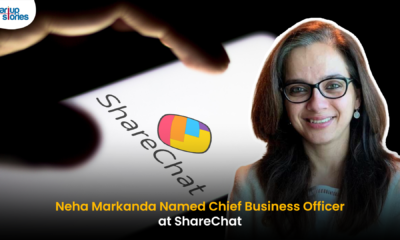Latest News
Google Acquires AI Startup Halli Labs

American search giant Google, has acquired four month old artificial intelligence and machine learning startup, Halli Labs. This marks the first Indian acquisition by the multinational company.
Excited to share that the @halli_labs team is joining @Google. https://t.co/RHxmXKKxZR
— Pankaj Gupta (@pankaj) July 12, 2017
In a medium blog post, Halli Labs announced their team would be joining Google’s Next Billion Users team to help get more technology and information into more people’s hands around the world. Halli Labs was founded by Pankaj Gupta with the goal of applying modern AI and ML techniques to old problems and domains. Gupta previously worked as the chief product officer and the chief technology officer in the now defunct homestay startup Stayzilla.
While the details of what Halli Labs would be working on are still not clear, Caesar Sengupta, Google’s Vice President of Product Management confirmed the acquisition through a tweet. The details of the acquisition were also not disclosed.
Welcome @Pankaj and the team at @halli_labs to Google. Looking forward to building some cool stuff together. https://t.co/wiBP1aQxE9
— Caesar Sengupta (@caesars) July 12, 2017
The Halli Labs team has been working on speed recognition and language processing, but so far has not shipped any technologies to customers. This Bengaluru based company was launched in April this year with the aim of giving “superhuman powers to all of us humans in letting us do whatever we want to do, better.”
Products such as YouTube Go, Google Station, Android Go among others are part of the Google’s Next Billion Users which, like the name states is about reaching and bringing on the internet’s next billion users.
India has emerged as one of the leading markets for startups working in the Internet and Technology sector. Multinational companies such as Facebook, Twitter and Apple have also acquired various Indian startups that are working on building products that solve problems for consumers, both in India and abroad.
Facebook acquired Bengaluru based Little Eye Labs startup that tracks and optimizes the performance of Android based mobile apps, in 2014. Twitter acquired another Bengaluru based startup ZipDial that uses India’s habit of giving missed calls to connect others. Most recently Hyderabad based AI startup, Tuplejump was acquired by Apple in 2016.
Latest News
Peak XV New Funds: $1.3B Commitment for India Startup Surge 2026

Peak XV Partners has launched three new funds totaling $1.3 billion, targeting India’s booming startup ecosystem. The lineup features the $600M Surge fund (8th edition) for early-stage ventures, a $300M Growth Fund for Series B+ scaling, and a $400M Acceleration Fund for rapid portfolio expansion. This commitment arrives as India’s VC inflows rebound, with AI and fintech leading 2026 trends.
These funds build on Peak XV’s legacy of backing unicorns like Zomato and Pine Labs, offering founders capital plus strategic guidance amid post-winter recovery. Early-stage deals surged 20% last year per Tracxn, positioning Peak XV to fuel the next wave of innovation in SaaS, climate tech, and consumer plays.
For startups eyeing Peak XV new funds or Surge fund 2026 applications, this signals prime opportunities. Investors and marketers should watch for deployment updates India remains a global VC hotspot.
Latest News
D2C Brand Neeman’s Raises $4 Million for Tier 2/3 Store Expansion & Eco-Friendly Shoes

Hyderabad, January 13, 2026 Neeman’s, India’s leading D2C footwear brand famed for sustainable shoes and patented PIXLL® technology, has raised $4 million from existing investors. This funding boosts its cumulative capital past $10 million since 2015, with a post-money valuation nearing $50 million. CEO Vijay Chahoria emphasized offline retail as the “next frontier,” planning 50+ new stores in Tier 2/3 cities like Jaipur and Lucknow to blend eco-friendly innovation with hands-on customer experiences.
In India’s booming D2C ecosystem where footwear sales hit ₹1.2 lakh crore in 2025 Neeman’s targets hybrid retail amid high online CAC and 25-30% returns. Backed by vegan, machine-washable shoes priced ₹2,000-4,000, the brand leverages PIXLL® (5x more breathable than leather) for carbon-neutral comfort. Recent 5x revenue growth to ₹100 crore ARR, 1M+ pairs sold via Myntra and stores, and awards at India D2C Summit 2025 position it ahead of rivals like Paaduks.
Neeman’s offline expansion India eyes the $15B sustainable footwear market by 2028, fueled by PLI schemes, Gen Z’s 70% eco-preference (Nielsen), and Southeast Asia exports. Challenges like real estate costs are offset by data-driven inventory and omnichannel QR tech. Watch for Q1 2026 launches in Hyderabad and Bengaluru redefining D2C success through authentic, “Wear the Change” branding.
Latest News
Centre Mulls Revoking X’s Safe Harbour Over Grok Misuse

The Centre is weighing the option of revoking X’s safe harbour status in India after its AI chatbot Grok was allegedly misused to generate and circulate obscene and sexually explicit content, including material seemingly involving minors. The IT Ministry has already issued a notice to X, directing the platform to remove unlawful content, fix Grok’s safeguards, act against violators, and submit a detailed compliance report within a tight deadline. If the government finds X’s response inadequate, it could argue that the platform has failed to meet due‑diligence standards under Indian law, opening the door to harsher action.
Under Section 79 of the IT Act, safe harbour protects intermediaries like X from being held directly liable for user‑generated content, provided they follow due‑diligence rules and promptly act on legal takedown orders. Revoking this protection would mean X and its officers could be exposed to criminal and civil liability for obscene, unlawful, or harmful content that remains on the platform, including AI‑generated images from Grok. This prospect significantly raises X’s compliance risk in India and could force tighter moderation, stricter AI controls, and more aggressive removal of flagged posts.
The Grok episode also spotlights the regulatory grey zone around generative AI, where tools can create harmful content at scale even without traditional user uploads. Policymakers are increasingly questioning whether AI outputs should still enjoy the same intermediary protections as conventional user posts, especially when they involve women and children. How the government ultimately proceeds against X over Grok misuse could set a precedent for AI accountability, platform responsibility, and safe harbour interpretation in India’s fast‑evolving digital ecosystem.













Tcjfsrrr
May 24, 2025 at 10:15 pm
Explore the ranked best online casinos of 2025. Compare bonuses, game selections, and trustworthiness of top platforms for secure and rewarding gameplaycasino.
ksephqjko
July 18, 2025 at 5:35 pm
Welcome to the delightful universe of Sugar Rush demo Türkçe Sugar Rush demo Türkçe, where players can immerse themselves in a vibrant candy-themed world. This game is designed to provide an enjoyable and entertaining experience filled with colors, sounds, and thrills that capture the essence of a sugary paradise. Whether you are an experienced gamer or a newcomer to the world of online slots, Sugar Rush offers something for everyone. In this article, we will delve deep into the various aspects of this game, including its mechanics, features, and why it has become a favorite among players. Aby rozpocząć grę na Aviator demo slot, musisz zarejestrować się na stronie gry. Następnie będziesz mógł zasilić swoje konto w grze i wybrać żądany zakład. Tak, w wielu miejscach istnieje opcja aviator grać online w trybie demonstracyjnym bez zakładów i bez konta. Jednak do pełnej wersji z możliwością aviator bet gra i wypłat, konieczne będzie założenie konta oraz weryfikacja tożsamości zgodnie z przepisami prawa hazardowego.
https://demo.bhumijplants.com/jak-aktywowac-automatyczny-bonus-w-bizzo-casino_1752668877/
Онлайн-казино Calibry calibri casino apk бонус без депозита, фриспины, турниры и выплаты без задержек. Рассказываем, как начать играть, какие игры выбрать и стоит ли доверять платформе. Free To Learn On-line Start Now! Read More » Our bonuses, which include typically the Delightful Reward of €450 + two hundred and fifty Free Of Charge Rotates, are usually right here to be able to help to make your current video gaming encounter even much better and boost your current probabilities of successful. The Pleasant Bonus will be created to give an individual… Also visit my web-site :: 룸 알바 Bahis sitelerinde deneme bonusu ile crash oyunlarına başlamak büyük avantaj, özellikle Aviator çok kazandırıyor!
qsyfvxynf
July 22, 2025 at 10:21 am
“Big Bass Floats My Boat” isn’t just a slot game; it’s a fishing trip packed with humor and excitement. Cast your line into these fun-filled waters and see what fortunes you can reel in. After all, in the world of slots, a good day fishing beats a good day anywhere else! Big Bass Xmas Xtreme will be a nice little addition to your Christmas slot list this year with familiar features and comforts of old. This fishing slot game adventure has some catching features to help you pursue and land the big wins. The features of Big Bass Floats My Boat are Wild Symbol, Money Symbol, Scatter Respin, Free Spins, Ante Bet, and Feature Buy. Plenty O’ Fish by Blueprint Gaming merges two of the most cherished and, arguably, most utilized slot themes: leprechauns and fishing. The game’s title itself gives a nod to the fun and potential pots of gold riches lying beneath its reels. Blueprint take their ever growing portfolio of fishing to slots to the Emerald Isles. You could say it’s a copy of Gameburger Studios’ Fishin Pots of Gold series. So, is this all rainbows and leprechauns or is it a quagmire of mixed signals? Can Plenty O Fish live up to its predecessors? Let’s find out.
https://francoisxavieresteve.com/lucky-jet-game-download-speed-benchmarked-a-review-of-1wins-popular-casino-game/
Players can view the gameplay at 4 speeds, easily switching between them during the round. The default speed is set to 2 and represented by an image of a person walking. Space XY is a superb game with a lot of assets. You can work out a strategy and play at minimum risk, enjoying the game. Considering the fact that the game is developed by a well-known provider BGaming, and it has a fair mechanism of the game, the risks are minimal for users. Aviator stands out as a premier online casino game that masterfully blends straightforward controls, fast-paced action, and exceptional winning potential. This multiplayer experience centers around betting on an ascending curve, visualized as a crimson aircraft that takes flight across the game screen when each round begins. Experience premium gaming entertainment on one of the most trusted gambling platforms through the official Aviator game. Explore an extensive collection of 3,000+ games that sees regular updates with the latest releases. Beyond Mostbet Aviator, test your fortune with numerous other instant-win options including popular titles like Plinko, Mines, Rocketon, and several others. Indian players can enhance their mobile gaming experience by downloading the dedicated Mostbet application, available for both Android and iOS devices. The platform stands out for its responsive customer support and user-friendly interface.
GO88
November 6, 2025 at 4:46 pm
Tham gia cộng đồng game thủ tại Go88 để trải nghiệm các trò chơi bài, poker phổ biến nhất hiện nay.
站群程序
November 10, 2025 at 1:49 pm
搭载智能站群程序,自动化搭建与管理,为SEO项目提供核心驱动力。站群程序
J88
November 12, 2025 at 4:53 am
Đến với J88, bạn sẽ được trải nghiệm dịch vụ cá cược chuyên nghiệp cùng hàng ngàn sự kiện khuyến mãi độc quyền.
站群程序
November 12, 2025 at 5:06 pm
采用高效谷歌站群策略,快速提升网站在搜索引擎中的可见性与权重。谷歌站群
Kuwin
November 16, 2025 at 3:47 pm
kuwin sở hữu kho game đa dạng từ slot đến trò chơi bài đổi thưởng, mang đến cho bạn những giây phút giải trí tuyệt vời.
iwin
November 18, 2025 at 11:01 am
iwin – nền tảng game bài đổi thưởng uy tín, nơi bạn có thể thử vận may và tận hưởng nhiều tựa game hấp
MM88
December 1, 2025 at 4:35 am
Với giao diện mượt mà và ưu đãi hấp dẫn, MM88 là lựa chọn lý tưởng cho các tín đồ giải trí trực tuyến.